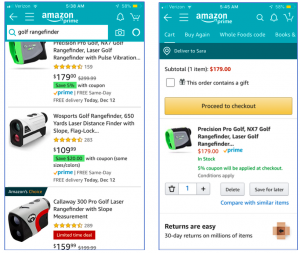Why do I buy my gadgets online? It’s not just because I can get a better deal — it’s because I can avoid the holier-than-thou attitude of technology sales representatives, who damage brand reputations on a daily basis and very often do not have customer interests at heart.
Technology companies pour resources, time, effort and staff training into creating innovative products and bringing them to market. However, it seems to be forgotten that it is not just price points, features, and the attractiveness of a product that matter. Once a customer enters the shop floor, a representative of the retail partner—or company itself—is just as important. Yet, in many scenarios, this important point in the chain of supply and sale seems to be ignored.
Let me give you a few examples.
Several months back I took a quick trip to Sydney, Australia.
I am an avid photographer. I own a Canon EOS 5D Mark iii, a plethora of L-series lenses and more kit than I’d be happy to admit to or attempt to justify. However, one thing I wanted to take with me was a good, sturdy compact camera that I could stow away in my bag and use on nights out, rather than risk my main camera while on my travels.
After doing some research online, I settled on the Canon Powershot G1X. Rapid, panic-fuelled packing and a brief passport expiry date heart attack later, I dashed into Currys—a U.K. retailer of tech, cameras and computers—in my local town, hoping that they might have the model I wanted in stock. I was met by a man in his early twenties, (who was very nice despite a slightly vacant expression and a constant, irritating jaw-grind caused by his chewing gum) that seemed to know about cameras and walked amongst his domain with a confident swagger.
After discussing photography for a time, we moved on to business. Sadly, the assistant said the Canon was not available, but moved me towards a fair Sony alternative.
Yes, it’s a pretty camera. It feels compact and sturdy, looks shiny, and the specs were good. He handed over the device, dropping it on the sales desk in the process, and then invited me to take a few example shots to scrutinize the image quality.
The battery was dead. With a quicksilver smile and rapid thinking, the assistant began extolling the virtues of the camera instead, including its low price (only for the next week!) and the fact the lens could be switched. This perked up my interest somewhat, and so the assistant insisted on showing me how the lens could be changed, unscrewing the kit lens and tilting the camera towards him as he spoke.
As I watched in horror, spittle erupted from his mouth and landed smack-bang in the camera’s middle, no longer protected from dust, dirt, or grime due to the detached lens—and possibly already suffering from its earlier catapult to the hard surface of the desk.
The shock I felt must have registered with him, as he glanced up and smiled—”Don’t worry, it’s fine”—before grabbing the bottom of his uniform shirt and proceeding to jam the cloth in to the gap, rubbing away the fluid in abandon.
It was worse than seeing someone clean a lens with steel wool.
However, despite the poor fate of the sales model, I liked the camera itself and asked to buy one. The assistant, glowing with misguided pride over securing a sale thanks to his wonderful pitch and professionalism, rummaged around for a boxed, new version I could only hope had been saved from spit or any other bodily fluid the sales reps could produce.
“Oh,” He said, with a frown. “We’ve only got the display model left; shall I box it for you?”
In typical British fashion, shock robbed me silent for several moments. In the same way that I once tapped a thief on the shoulder after they stole my bag in Madrid before flying into a frenzy and wrestling it off them, I took the passive-aggressive, non-direct way to crush his hopes of a sale, trying to keep my temper firmly on a leash.
“It is a display model,” I said slowly. “…and in the last five minutes, I’ve seen a man drop it, spit in it and then use a dirty t-shirt to ‘wipe it clean’ one of the most fragile places on the camera. And you want me to spent £550 on it?”
“Well.. yes.” He responded, not seeming to register my horror of the events that had unfolded. “You need this camera now, before your trip, don’t you?”
“Not that particular camera I don’t.” I responded. “… You’re… you’re not going to sell that one on, are you?”
In response to my question and feeling the pinch of a lost sale, the assistant smiled at me in a condescending fashion—although I also expected a pat on the head by this point—turned, and placed the camera back on the shelf besides its bright pricing sticker.
Aggressive tactics are often used in sales. Cold calling, charities pulling on the heartstrings, the induction of panic by scammers pretending to be virus-fighting Microsoft reps—the successful sale of a product often relies on an emotive pitch. You’re not selling a product; you’re selling the fear of not living with the product to a consumer, whether it be the latest shiny iPhone or Herbal Essences “orgasmic” shampoo (think of the fun you’re missing out on!).
The assistant in Currys attempted to leverage the fear of not owning the camera in time for my vacation, and presumed I was ignorant enough to buy the item—despite how he treated it—and this is no different to the next scenario, where sales reps used a presumed lack of understanding to make their sale.
Two months later (and after I secured a Canon after all online), I received a call from my grandma. Self-admittedly not the most tech-savvy type, she only uses a computer for online grocery shopping and to look up puzzle solutions for the Nintendo game series Professor Layton. My grandmother needed a large-screened PC suitable for both her eyes and basic tasks—but did not want to be taken for a ride and had no idea in the congested market what to buy.
Being the on-call IT support in the family, naturally, I was summoned to accompany her on the trip to PC World.
The moment my bespeckled, short grandma shuffled in to the store, two assistants swooped down to snag her attention. With a cold smile, I pushed them away briefly, stating that we wanted to browse first. I was presented with their backs while I asked my grandma what her budget was. Being on the lesser side of figures spent on PCs, I quickly picked along the rows of computers on sale, pointing out several that could be of use.
A large screen, Windows operating system and fair specifications would do. We eventually settled for an HP Pavilion, although we were told that only the display model was in stock, and that was not for sale. The assistant in this scenario, an oily creature with a contemptuous turn of the lip, told us that a Lenovo IdeaPad would be far more suitable.
“Just try it,” the PC World employee insisted, despite being told it was out of budget. “It’s a responsive computer and is touchscreen…SSD…8GB memory…intuitive…cloud…Lenovo motion control….”
Being blasted with terms unfamiliar to her, my grandma turned to me silently, confusion deeply rooted in her eyes. The aggressive pitch angered me, and I insisted, time and time again, that she didn’t need a touchscreen, cloud access, and didn’t care how much RAM the PC contained. In the end, I snapped at the too-enthusiastic sales rep, a creature encountered every time I stepped in to the store, and asked him to wait until we found an alternative among the product offerings.
Eventually, we found a substitute HP, slightly more expensive but close enough. The next issue: my grandmother, used to Windows 7, grappled with Windows 8—utterly lost in the attempt to find an icon for the Web and floundering due to the missing Start button. I assured her I would rip out the operating system and replace it with the beloved Windows 7 OS as soon as we got it back, and so proceeded to purchase the item.
See also: This is no way to buy a Windows PC
We were seated, while the next assistant—a lumbering, slow creature who didn’t seem to understand differences between operating systems or why anyone on this planet wouldn’t want to use a touchscreen—then began touting the dreaded next step in purchasing a PC: the ultimate, awesome antivirus that we simply had to buy.
“It’s McAfee,” I said, rolling my eyes. “She’s not buying it. I can download something suitable for free, or a fraction of the price of this subscription.”
“But it can go across all your devices, the same as the free cloud backup storage we offer…” He protested.
“My nan uses it for online shopping, not looking at porn, and doesn’t have a smartphone or tablet. Malwarebytes or SpyDoctor will do just fine. And we don’t need cloud access. She doesn’t know, or care, what cloud is.”
The refusal of McAfee seemed to be commonplace, and was accepted with little argument. However, the assistant took himself off and spoke to the manager—because “he needed management signatures before giving us the free cloud service.” I glared at his back; it was obvious he hadn’t listened to a word I’d said. Eventually, after a ten-minute wait, he returned, just to have it refused once more.
“She’s not going to use it, we don’t want it. I don’t care if it’s free at the moment, there’s no need for it.”
“Oh.” The message finally registered with the PC World employee. “But how about the insurance? Or we have a great deal on antivirus products…”
My grandma, amidst the exchange, had the bomb-blast look you usually see on parents with their kids in Disneyland—overwhelmed, confused, and probably having forgotten where she was. If let alone, I have no doubt she would have bought the antivirus, as well as a plethora of other add-ons shoved down her throat.
What is the point of relating these experiences? Consumer technology is meant to make lives easier, but as it becomes more complex and more intuitive, the bare bones, simple functions and basic customer service are often left behind. Where there lies confusion, there lies the opportunity for snake-oil salesmen to take advantage. Within a pit of commission-hungry snakes, the bare product facts on the Internet provide solace—but only if you know what you’re looking for.
The problem is that these same salespeople are meant to be representing companies and their products to full advantage. The man that dropped and spat in the Sony camera—no doubt having sold the model on since its internal destruction—had no interest in the fact the camera is unlikely to perform to the standard it should have for the oblivious customer who bought the product. If the camera failed, is the customer likely to want to purchase another Sony camera? Perhaps not. Consumers want good products, but they also require reliability. Whether this is down to the company itself or its third-party retailers, a customer doesn’t care—if they are forced to go through warranty arguments, insurance claims, and general inconvenience, they are unlikely to return.
The men who attempted to capitalize on a pensioner to make her buy a more expensive laptop with features useless to her had not the customer in mind, but probably only their commission or reputation in the store. If we compare these hard-sell tactics to the trained staff within an Apple store, for example, you can see the problem: In short, if a tech company wants to profit, it doesn’t happen just in the development stage of a product.
It happens on the shop floor, where the product is introduced to a customer.
However, we must keep in mind that not all sales staff are like this, and if they are, it is sometimes down to a lack of investment and training within their profession—and in this arena, third-party retailers are at fault. While the Internet can be a confusing place to find a product, it is not only price points that make purchasing online more attractive—it is the option to avoid hard sales tactics, poor product representation, and upselling. Retail outlets therefore lose out, thanks to undertrained and lacklustre staff who often try to take advantage of customers.
The weakest link in cybersecurity chains is usually people, and mistakes are caused by human error and a lack of care, training, and understanding. The sales world is no different, and thanks to the Web, standards need to rise if these types of outlets that are not brand-specific are going to survive—a lesson stores like Currys and PC World should learn.
Read more on ZDNet (blog)
(649)
Report Post





